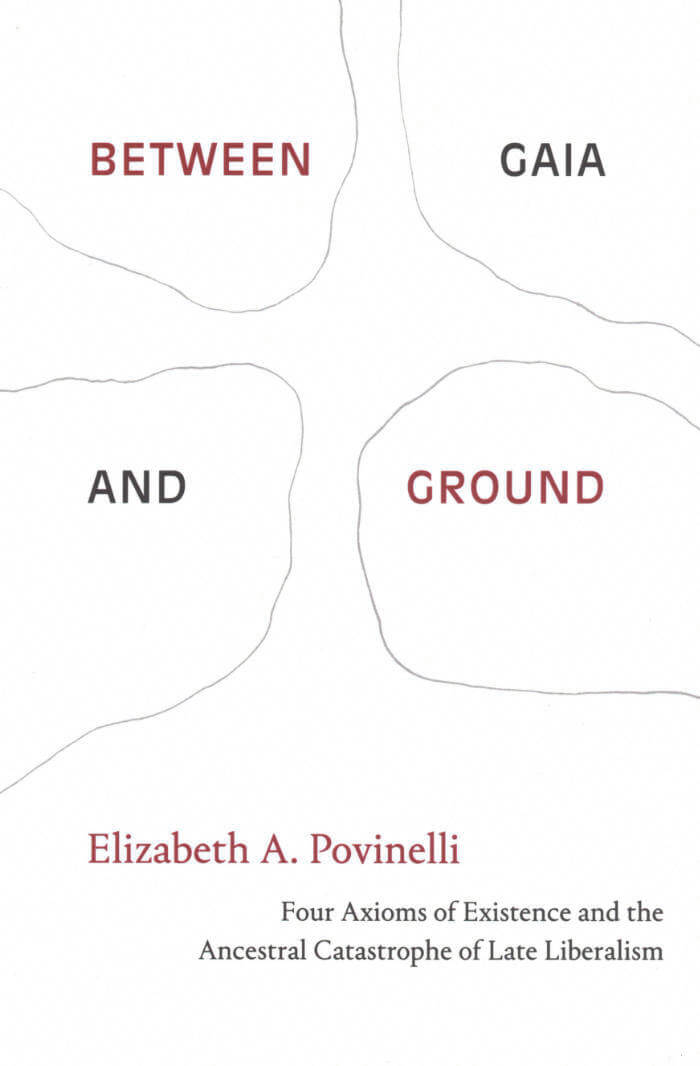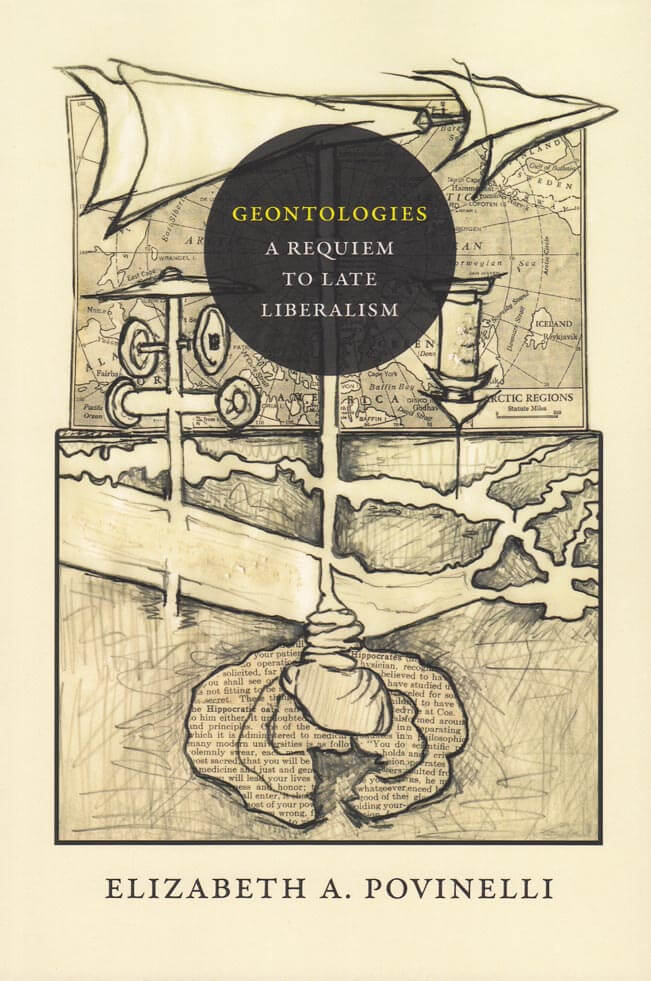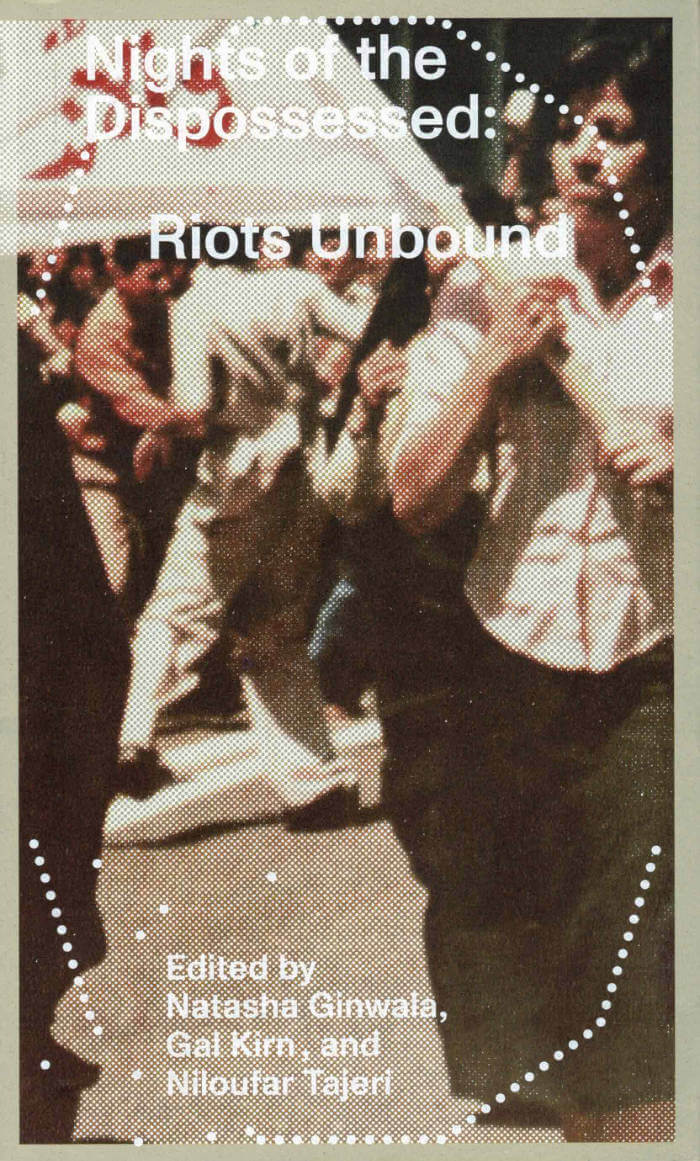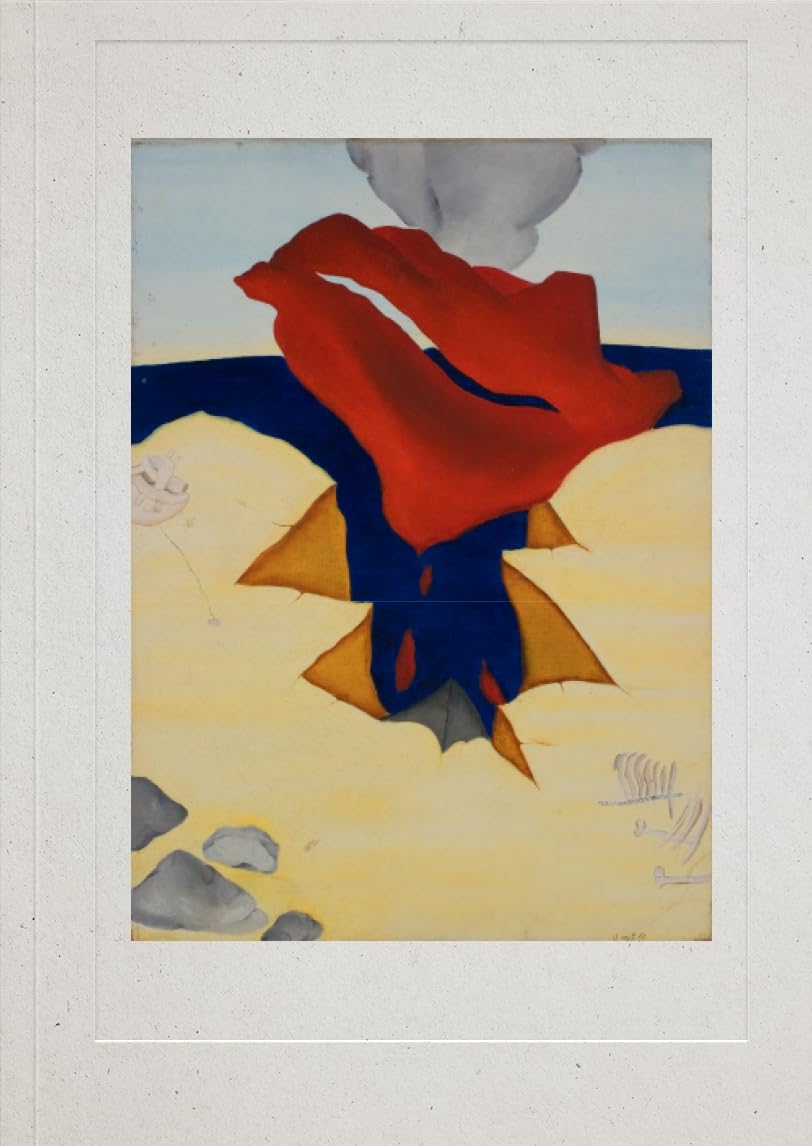Elizabeth A. Povinelli
Elizabeth A. Povinelli

Routes/Worlds
Elizabeth Povinelli's anthropology of the otherwise locates itself within forms of life that run counter to dominant modes of being under late settler liberalism. In these essays, she considers the emergence of new worlds and the extinguishment of old ones, seeking to develop a social imaginary that can sustain radical potentiality without turning a blind eye to our deep interdependence.

Between Gaia and Ground
In Between Gaia and Ground Elizabeth A. Povinelli theorizes the climatic, environmental, viral, and social catastrophe present as an ancestral catastrophe through which that Indigenous and colonized peoples have been suffering for centuries. In this way, the violence and philosophies the West relies on now threaten the West itself.
Engaging with the work of Glissant, Deleuze and Guattari, Césaire, and Arendt, Povinelli highlights four axioms of existence—the entanglement of existence, the unequal distribution of power, the collapse of the event as essential to political thought, and the legacies of racial and colonial histories. She traces these axioms' inspiration in anticolonial struggles against the dispossession and extraction that have ruined the lived conditions for many on the planet. By examining the dynamic and unfolding forms of late liberal violence, Povinelli attends to a vital set of questions about changing environmental conditions, the legacies of violence, and the limits of inherited Western social theory.
Between Gaia and Ground also includes a glossary of the keywords and concepts that Povinelli has developed throughout her work.

Geontologies: A Requiem to Late Liberalism
In Geontologies Elizabeth A. Povinelli continues her project of mapping the current conditions of late liberalism by offering a bold retheorization of power. Finding Foucauldian biopolitics unable to adequately reveal contemporary mechanisms of power and governance, Povinelli describes a mode of power she calls geontopower, which operates through the regulation of the distinction between Life and Nonlife and the figures of the Desert, the Animist, and the Virus. Geontologies examines this formation of power from the perspective of Indigenous Australian maneuvers against the settler state.
And it probes how our contemporary critical languages—anthropogenic climate change, plasticity, new materialism, antinormativity—often unwittingly transform their struggles against geontopower into a deeper entwinement within it. A woman who became a river, a snakelike entity who spawns the fog, plesiosaurus fossils and vast networks of rock weirs: in asking how these different forms of existence refuse incorporation into the vocabularies of Western theory Povinelli provides a revelatory new way to understand a form of power long self-evident in certain regimes of settler late liberalism but now becoming visible much further beyond.
And more

Nights of the Dispossessed
Natasha Ginwala, Gal Kirn and 1 more
Riots are extraordinary events that have been recurring with increasing frequency and occupy a highly controversial space in the political imagination. Despite their often negative portrayals, it is undeniable that riots have played a pivotal role in the confrontation between authority and dissent. Recently, with the deepening crises of capitalism, racial violence, and communal tension, an “age of riots” has powerfully begun. As master fictions of the sovereign nation-state implode, and the hegemonic silencing of the dispossessed reveals the cracks in governability, Nights of the Dispossessed: Riots Unbound brings together artistic works, political texts, critical urban analyses, and research projects from across the world in an endeavor to “sense,” chronicle, and think through recent riots and uprisings—evoking a phenomenology of the multitude and surplus population.
With contributions from Asef Bayat, Joshua Clover, Vaginal Davis, Keller Easterling, Zena Edwards, Nadine El-Enany, Dilip Parameshwar Gaonkar, Gauri Gill, Natasha Ginwala, Natascha Sadr Haghighian, Louis Henderson, Satch Hoyt, Hamid Khan, Gal Kirn, Josh Kun, Léopold Lambert, Margit Mayer, Vivek Narayanan, Ai Ogawa, Oana Pârvan, Elizabeth A. Povinelli, SAHMAT, Thomas Seibert, Niloufar Tajeri, Chandraguptha Thenuwara, Dariouche Tehrani, and Ala Younis.

Dreaming Water
Dreaming Water is the most thorough monograph dedicated to the work of Chilean artist Cecilia Vicuña to date. Vicuña coined the term “Arte Precario” in the mid-1960s as a new category for her works composed of debris and structures that disappear in the landscape, and which also include her quipus (“knot” in Quechua), envisioned as poems in space.
Dreaming Water brings together over 200 works—including paintings, drawings, screenprints, collages, textiles, videos, photographs, installations, poetry, artist books and performances—created throughout the artist’s remarkable career. It also features several stimulating texts—a lengthy epistolary piece by curator and editor Miguel A. López as well as new essays by anthropologist Elizabeth A. Povinelli, curator Catherine de Zegher and art historian José de Nordenflycht. Vicuña herself contributes two texts, reflecting on her drawings from the “Palabrarmas” project and the activism of the group Artists for Democracy, which she cofounded in 1974. A rousing conversation between Vicuña, anthropologist Marisol de la Cadena and curator Camila Marambio also figures in the book, blending the artist’s voice with those who are experts in fields pertinent to her practice.

Citizens of the Cosmos
This book on the films of Anton Vidokle features essays and conversations by theorists, curators, and artists exploring the themes of technological immortality and resurrection informed by Cosmist philosophy.
Citizens of the Cosmos examines the artist Anton Vidokle's films and the Cosmist philosophy underpinning them. It features essays and conversations with Vidokle by seminal contemporary theorists, curators, and artists: Franco "Bifo" Berardi, Keti Chukhrov, Liam Gillick, Boris Groys, Daniel Muzyczuk, Miguel Amado and Georgia Perkins, Elizabeth Povinelli, and Raqs Media Collective. This is the first book to survey Vidokle's Cosmism-related filmic output, begun in 2014, and includes full scripts from the films.
The book's contributors speculate on Vidokle's Cosmist conceptions of technological immortality, utopian resurrection, museology, and space travel, grappling with how these ideas embroil or crystallize contemporary theories, practices, and technologies: atmospheric manipulation, cryonics, biopolitics, extraplanetary prospecting, geo-engineering, transhumanism, genetics.
Franco "Bifo" Berardi disagrees with the Cosmist conjecture of death as a flaw in the conception of the human being. Elizabeth Povinelli digests the life-nonlife mattering of dust through relationships to and from the human and more-than-human ancestors to come.
Boris Groys contemplates the gravitational forces between Cosmism and communism according to cosmic and social orders, grounded as they are in the laws of both physics and socialist politics. Keti Chukhrov considers the formation of thinking through madness, dying, and reasoning according to Cosmist philosophical and religious debates and beliefs.
Raqs Media Collective and Anton Vidokle discuss different cultures of death, finitude, and rituals. Miguel Amado and Georgia Perkins examine the in-betweeness of the categories of life and death through the designs of terraforming vehicles navigating interplanetary space travel.
Daniel Muzyczuk investigates Vidokle's interests in the context of the history of the collection at the Muzeum Sztuki in Łódź, while Liam Gillick and Anton Vidokle converse about filmmaking references and methods, from voiceover narrative to editing processes.
Edited by Miguel Amado. Contributions by Franco "Bifo" Berardi, Keti Chukhrov, Raqs Media Collective, Liam Gillick, Boris Groys, Daniel Muzyczuk, Miguel Amado and Georgia Perkins, Elizabeth A. Povinelli.

Wonderflux – A Decade of e-flux Journal
Wonderflux brings together a group of longtime contributors with graphic artists to collaborate on illustrated essays and develop a new pictorial language around some of the emergent consistencies and overarching issues that defined the first decade of e-flux journal.
In Wonderflux you will find yourself in front of disappearing mirrors held up to curators, critics, and artists; sailing through counterfactual universes; face-to-face with cold-blooded killers, faceless men, weary but buoyant prophets; all the while imbued with stubborn thriving and stubborn refusal to be moved or monetized, and once in a while having earnest conversations with robot(s and) workers.
The authors included here have shaped the varied concerns and urgencies of e-flux journal since 2008. As a theory-driven art journal made up entirely of hypertext and digital images and embraced by academic circles, we sometimes wonder about the artistic and sensual use of text and image. Does the thinking of some of our favorite authors also speak to a place beyond floods of automatic links and references and rectangular photographic portals? To a broader and more applied artistic domain like the imaginative sensibility of illustration, where entire worlds arise from the simple and deliberate placement of lines on paper?
Contributions by Franco “Bifo” Berardi, Raqs Media Collective & Freddy Carrasco, Liam Gillick, Elizabeth A. Povinelli & Clara Bessijelle Johansson, Martha Rosler & Josh Neufeld, Reza Negarastani & Keith Tilford, Hu Fang & Mojo Wang, Keller Easterling & Meijia Xu.

Expanded Nature – Écologies du cinéma expérimental
If it can be said that experimental filmmakers are "expanding" the artistic field through an exploration of the potencies, modes of dissemination, or even performance of the moving image, in the Anthropocene age, these practices hope for another kind of expansion: to expand our experience of nature.
Appending flowers to the film strip or burying it in the ground, inventing observation devices, allowing the camera to be affected by natural forces, engaging one's own filming body in a symbiotic relationship with the environment, reconstituting ecosystems at the moment of projection: the ecologies of experimental cinema presented in this book constitute forms of practice and engagement that awaken a heightened sensitivity to the living world through cooperative links, casting other beings as subjects and agents of filmic processes, and, finally, reshaping the economy of filmmaking. Thus, ecologies of perception, medium, production and multinaturalism are deployed, contributing to the restoration of our sensory bond with the natural world.
Addressing technical, aesthetic and anthropological issues of cinema, Expanded Nature – Écologies du cinéma expérimental (Ecologies of Experimental Cinema) considers how filmmakers and collectives from different parts of the globe form communities with other non-human beings and work through their films to deconstruct human privilege. At the crossroads of disciplines, anthropologists, philosophers, filmmakers and artists, and researchers in visual studies come together and investigate a different history of cinema, written from the point of view of nature.
Texts by Elio Della Noce, Scott MacDonald, Jean-Michel Durafour, Kim Knowles, Philip Hoffman & Janine Marchessault, Karel Doing, Chris Dymond, Alice Leroy, Rose Lowder, Chris Welsby, Yaniv Touati, Bidhan Jacobs, Lucas Murari, Teresa Castro, Colectivo Los Ingrávidos, Elizabeth A. Povinelli, Gérard Leblanc, Frédéric Brayard, Jacques Perconte, Vincent Deville, Lukas Brasiskis & Charlie Hewison.

Spike #69 — Storytelling
There are three sides to every story: your side, my side, and the truth. But how does this formula stand up when competing interests are fighting for narrative control? Where does self-expression end and branding begin? Let’s rewrite the story of how stories are written. Spike’s cast includes a Pomeranian and a psychoanalyst, an anthropologist and anonymous Instagrammers. Their tales are varied (and variously faithful), but what business do we have going to bat for consensus reality? They break out of tired oppositions to embrace anxiety, headlessness, and nonsense. So stop fronting, set your subjectivity aside, and settle in for some show and tell. For better or worse, stories are a way of remaking – not just recounting – the world!
With contributions by Elizabeth A. Povinelli, Joshua Citarella, Tea Hacic-Vlahovic, Martin Herbert, Omar Kholeif, Ingrid Luquet-Gad, Sean Monahan, features on Tracey Emin, Sophie Calle, Julien Ceccaldi, Ho Tzu Nyen, and many more, as well as reviews from Hong Kong to Los Angeles to Vienna.